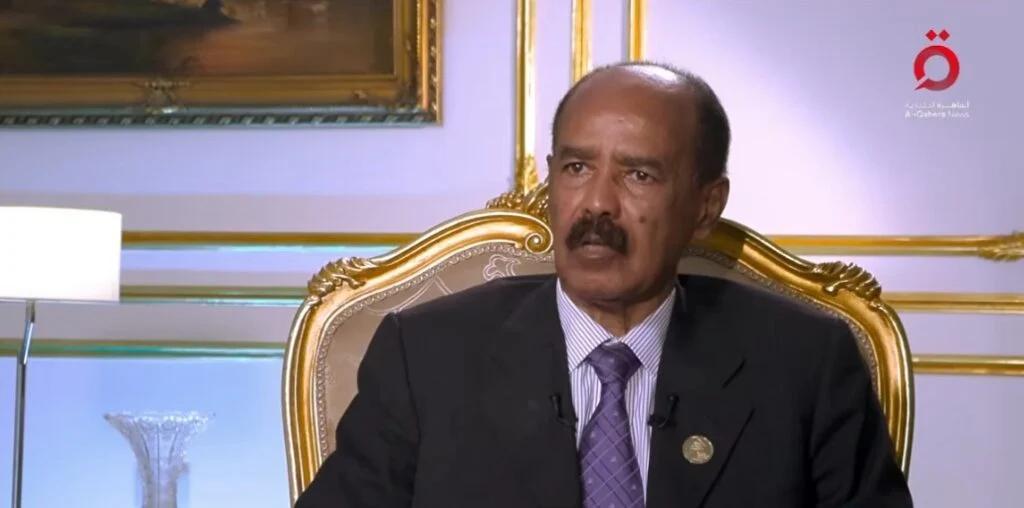Africa-Press – Ethiopia. November 5, 2025 3 minutes read Addis Abeba – Eritrean President Isaias Afwerki has accused foreign powers of deepening instability across the Horn of Africa, the Red Sea region, and the wider continent, during a wide-ranging interview with Egyptian local media aired on Tuesday.
His remarks came as part of a five-day official visit to Egypt which concluded Tuesday, where he held talks with President Abdel Fattah El-Sisi on regional security and bilateral cooperation.
The two leaders described the meeting as “comprehensive discussions” focusing on strengthening economic, political, and security ties, as well as coordinating efforts to promote stability in the Horn of Africa and the Red Sea region. President El-Sisi reaffirmed Egypt’s “firm commitment to supporting Eritrea’s sovereignty and territorial integrity,” while President Isaias praised Cairo’s role in promoting stability and development across the Horn and East Africa.
According to Eritrea’s Ministry of Information, the discussions also reviewed progress on previous agreements and explored new areas for cooperation in investment and development. Both sides emphasized the “historical depth” of Eritrea–Egypt relations and agreed to enhance coordination on regional and international matters of mutual interest.
In his interview with local media alqaheranews Tuesday, President Isaias expanded on these themes, and added that conflicts in the Horn of Africa have become “complicated due to the intervention of various forces and governments.” Citing Somalia, Ethiopia, and South Sudan, he argued that instability in these countries is “not only internal but also regional and even global.”
“Somalia is a country with 3,300 kilometers of coastline, and this length of coastline in such a strategic location has denied the country stability,” he said. “Somalia’s problem is not just internal but also a regional and global issue.”
Turning to Ethiopia and South Sudan, Isaias remarked, “what we have observed over the past 30 years is ethnic division, ethnic fragmentation, and instability. South Sudan, which separated from Sudan, has become an unstable country plagued by civil war.” He criticized the growing deployment of international “special envoys” to resolve regional conflicts, saying such interventions “complicate the situation and make it intractable.”
“The responsibility is primarily internal,” he said. “No organization – big or small, regional or global – requires any intervention. Yet this kind of interference has continued for more than 80 years. External actors are not needed to intervene unless to complicate internal and local situations in every country.”
On maritime security, Isaias once again asserted that Red Sea states must “take ownership” of their waters. “The countries of this region must shoulder their responsibility to secure this international waterway,” he said. “They must be able to secure their coastlines first, not external forces. Eritrea can secure its coastline, and so can Somalia, Yemen, Djibouti, Sudan, and Saudi Arabia.”
He further warned that allowing foreign military bases in the region invites “problems and complications,” and that no external force is required to safeguard the Red Sea.
President Isaias’s visit to Egypt marks another round of high-level engagement between Asmara and Cairo amid shifting Red Sea dynamics. The two countries have strengthened their coordination over the past year, including through a tripartite mechanism with Somalia launched in Cairo in January to align positions on regional security in the Red Sea, Libya, and the Sahel. Egypt has repeatedly voiced opposition to the involvement of “non-littoral states” in Red Sea governance.
Isaias’s visit also came just two days after Ethiopian Prime Minister Abiy Ahmed reignited debate over Ethiopia’s lack of direct sea access during a parliamentary appearance. Abiy described Ethiopia’s demand for Red Sea access as “a matter of national existence,” asserting it should be seen “not as provocative, but as a question of survival.”
Abiy said Eritrean authorities were aware of Ethiopia’s position, and admitted that he had discussed the issue with Isaias in Asmara and Assab following their 2018 rapprochement.
Analysts say Isaias’s Cairo visit, coinciding with Abiy’s renewed rhetoric on maritime access, is part of Asmara’s attempts to intensify diplomatic maneuvering among Red Sea states as Ethiopia continues to frame sea access as central to its national agenda. AS
For More News And Analysis About Ethiopia Follow Africa-Press






